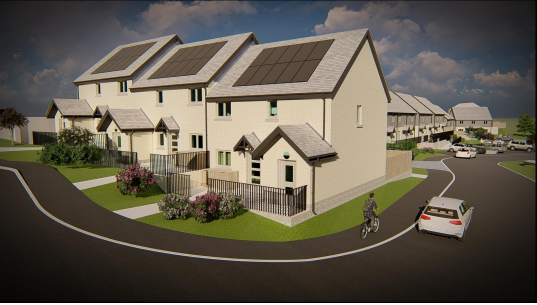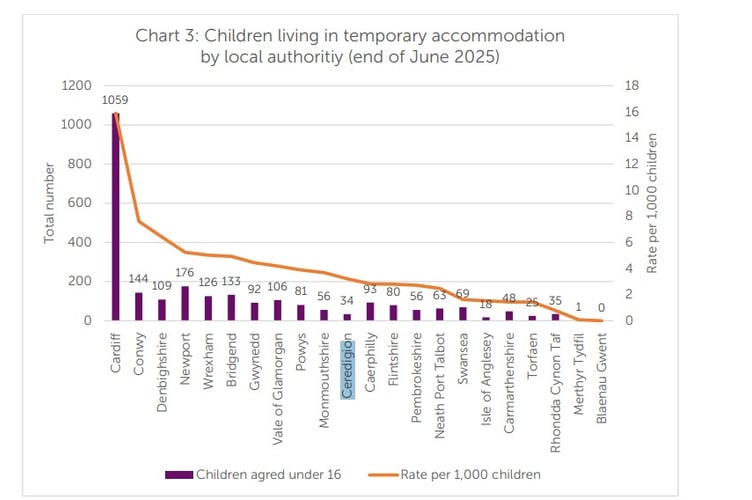A CEREDIGION councillor is calling for a complete overhaul of social housing across Wales saying families finding somewhere to live is the number one question he is asked on a weekly basis.
Cllr Carl Worrall in Penparcau says that there are too few social houses and not enough help for young families to get on the housing ladder across all of Wales and is calling for systematic change and more house building to address the crisis, saying ‘we are letting our young people and old people down’.
Cllr Worrall said: “I get asked by people on an almost daily basis to help them either get a social house or find a way to get a home for their family.
“Working families need a break and at the moment we are letting them down.
“Be it sky-high mortgage deposits or the cost of renting privately in places like Aberystwyth, something needs to change.
“It’s upsetting when I have families coming to me and there is nothing I can really do.
“This isn’t a Ceredigion County Council issue. The housing department are very good. We just don’t have enough houses for the demand.
“Social housing should be a priority.”
There are approximately 3,000 social houses in Ceredigion currently.
Various schemes are underway to help local people get on the housing ladder such as Section 106 agreements and help to buy.
Social housing providers such as Wales and West and Barcud are also building new homes in the area, with two schemes underway in Penparcau alone, one along Piercefield Lane and more housing due to be built on the site of the former Bodlondeb nursing home in the centre of the village.
On the new developments, Cllr Worrall added: “We need to ensure that these new houses go to people from the area. That will then free up other housing stock elsewhere.
“Everyone is on the breadline these days and we need to do more to help our young families.
“Especially when mortgages need a 20 per cent deposit. How are families in this area going to raise that money when house prices are so high and rent is usually around £1,000 a month. You have no chance of saving for a deposit.
“We need changes to the planning system to make it easier to build social housing. It’s time we looked again at the local development plan.
“It needs a complete overhaul.
“We are losing youngsters from Ceredigion hand over fist. The lack of jobs and house prices is causing the problem.
“Chickens are coming home to roost after the issue hasn’t been dealt with for years. The whole system is broken.
“The loss of care homes too makes the problem harder. We need to build sheltered accommodation where older people can move to, downsizing and freeing up other homes.
“Not everyone wants a three bedroom house on their own waiting on the family to visit and a lot of older people get lonely.
“A lot of this is outside of Ceredigion County Council’s control. Their hands are tied.”
It was revealed earlier this year that Ceredigion is the least affordable county in all of the UK for first-time buyers to get on the property ladder, according to new research.
Skipton Group’s Home Affordability Index Report has revealed that six local authority areas in Wales are in the 10 least affordable areas of Great Britain for potential first-time buyers.
Ceredigion takes the bottom spot as the least affordable local authority area.
Here only 2.7 per cent of potential first-time buyers can afford the average first-time buyer home.
The remaining five Welsh local authority areas are Powys (2.7 per cent), Pembrokeshire (2.9 per cent), Cardiff (3.0 per cent), Vale of Glamorgan (3.1 per cent), and Monmouthshire (3.3 per cent).
This chronic lack of affordability across Wales is the result of consistently low first-time buyer incomes; for example, Ceredigion has one of the lowest median incomes in Great Britain.
While house prices across Wales are lower than the average in Great Britain, areas like Ceredigion and Powys are relatively high for Wales, creating particularly difficult conditions for those dreaming of getting the keys to their first home in these areas.
Stuart Haire, Skipton Group CEO, said: “People might expect London and the Southeast to dominate the least affordable areas for first-time buyers looking to get onto the property ladder in Great Britain, so it’s shocking to see Wales feature so heavily.
“The first step onto the property ladder remains by far the hardest but for Welsh first-time buyers, it must feel impossible. Our new data shows just how stark their affordability challenge is, yet it is further exacerbated by the absence of any land transaction tax relief for first-time buyers in Wales.”
Speaking earlier this year, Ceredigion County Council said: “Ceredigion County Council are acutely aware of the housing pressures in the county and expend substantial resources in trying to ameliorate this issue.
“The planning service have a target to achieve 20 per cent of all housing to be affordable county wide and have exceeded this target with 37% of housing permitted and 33% of all housing built since Local Development Plan adoption being affordable, Discount for Sale or Intermediate Rental properties.

“In the past year, the council has introduced the Community Housing Scheme, a shared equity product, to support people to get on the housing ladder. As an authority prioritizing affordable housing delivery is a central pillar of our Corporate Strategy, Local Wellbeing Plan, Housing Strategy and Local Development Plan.
“We continue to strive to find ways to maximize housing opportunities county wide.”
Concerns have also been raised this week over the number of children in Wales living in temporary accommodation.
Figures show that at the end of June this year, there were 34 children under the age of 16 living in temporary accommodation in Ceredigion, with 92 in Gwynedd, 81 in Powys and 48 in Carmarthenshire.
However, no children in Ceredigion were living in bed and breakfasts.
The health and wellbeing of thousands of children in Wales are being put at risk by temporary accommodation warns think tank.
New report by the Bevan Foundation evidences the risk of physical harm which unsuitable temporary accommodation is posing to children, as well the serious effect it can have on their wellbeing and ability to develop and learn.

Thousands of children across Wales are going to bed in a place which they cannot call home. At worst, they will be sharing a single hotel, hostel or bed and breakfast room with their family with limited access to essentials like being able to cook or do laundry. At best they might have their own front door and a whole house to themselves, but there will be constant uncertainty about when the next move will be.
Just living as a family and doing the things which others will take for granted can all be extremely challenging. A life living in the limbo of temporary accommodation means uncertainty, a lack of space and privacy, and challenges in just simply enjoying life together. Even accommodation which has been designed for the support needs of families, such as hostels and refuges, can have its limitations when temporary stays last for months or even years.
Wendy Dearden, Senior Policy and Research Officer at the Bevan Foundation, said: “Securing suitable accommodation for homeless families is really difficult in the current housing market. Regulations are in place around the suitability of temporary accommodation, but these are not being enforced. Local authorities are working hard in difficult circumstances but there is a systemic culture in both local and Welsh government that “we are doing the best that we can”. The Bevan Foundation believes that Wales needs to do better when providing for children and families living in the most vulnerable of circumstances.
“The statistics show that the number of homeless families living in the worst conditions are reducing, but there is still more work to do. Regulations are not being met or enforced, and the Bevan Foundation believes that the expectations set out in those regulations are not of a high enough standard.
“We have found evidence of dangerous overcrowded conditions, worrying sleeping arrangements for infants, and accumulations of personal belongings. Most worrying is the knowledge that unexpected child deaths have occurred in temporary accommodation in Wales. The Bevan Foundation have estimated that this is 1 or 2 deaths per year - the equivalent of one in every 100 infant and child deaths - but we can only estimate this, as there are no clear data collection processes in place in Wales.
“Despite guidance on minimising disruption to education when placing children in temporary accommodation, the reality is that in most cases homelessness will impact on a child’s learning. We heard of children struggling to get to school when their temporary accommodation is a distance away from it, and that frequent moves between different accommodation caused lots of disruption. Schools have told us that they would be able to provide more support to their pupils if they knew that they were experiencing homelessness, but that this is rarely the case.”
Katey Jo-Pilling, a Peer Researcher at Shelter Cymru, added: “The stress and worry that temporary accommodation causes for families is palpable when we speak to them. Whether it's that they're stuck in damp or mouldy homes, that they're living in a hotel with strangers in the next rooms, or that their family is forced to move two or three times in the space of a few months - children and their parents feel this stress and it impacts every part of their lives
Rocio Cifuentes, the Children’s Commissioner for Wales said: “Many children and their families who are experiencing homelessness are living in terrible conditions across Wales. Children are being failed, and as this report shows, there is far more we could be doing to keep them safe until their housing situation has been resolved.”
The report provides recommendations which do not require wider systemic change - just sensitive, proactive thinking to provide a protective, supportive place for homeless families to have as normal a life as possible. These include simply but impactful measures such as prohibiting the use of hazardous accommodation, providing cots and free travel passes.
The Salvation Army has also raised concerns over homelessness in Wales, saying the latest figures for households in Wales experiencing homelessness highlight a need to focus on underlying issues including poor mental health, relationship breakdown and poverty.
It comes as the latest figures from Statistics Wales show that homelessness in Wales has remained around the same level in 2024/25 compared to the previous year with more than 13,000 households assessed as homeless by councils in Wales (13,287 representing a decrease of 2% compared to 2023/24).
Andrew Connell, Policy Manager at The Salvation Army, said: “It’s good to see a fall in the number of people experiencing homelessness in Wales last year. We must remember that the trend over time has been ever upwards and that needs to be reversed.
“The Homelessness and Social Housing Allocation Bill, which is currently going through the Senedd, contains a lot that we would welcome, especially its emphasis on prevention and widening access to homelessness services. However, both the Westminster and Welsh Governments must address the shortage of affordable housing stock, especially social housing.”
Catherine Docherty, Area Operations Manager for The Salvation Army’s Homeless Services in Wales, said: “Every person deserves a safe place to call home. It’s encouraging to see a slight reduction in the number of people experiencing homelessness in Wales last year, but the landscape of homelessness is complex and underpinned by poverty, mental health, relationship breakdown and substance use. On the ground, our teams continue to work hard in residential settings, street work and projects across Wales to help people find and keep a suitable home.”
Earlier this year, The Salvation Army welcomed the introduction of The Homelessness and Social Housing Allocation (Wales) Bill, by calling on the Welsh Government to take the opportunity to reset funding, promote collaboration and improve support.





Comments
This article has no comments yet. Be the first to leave a comment.